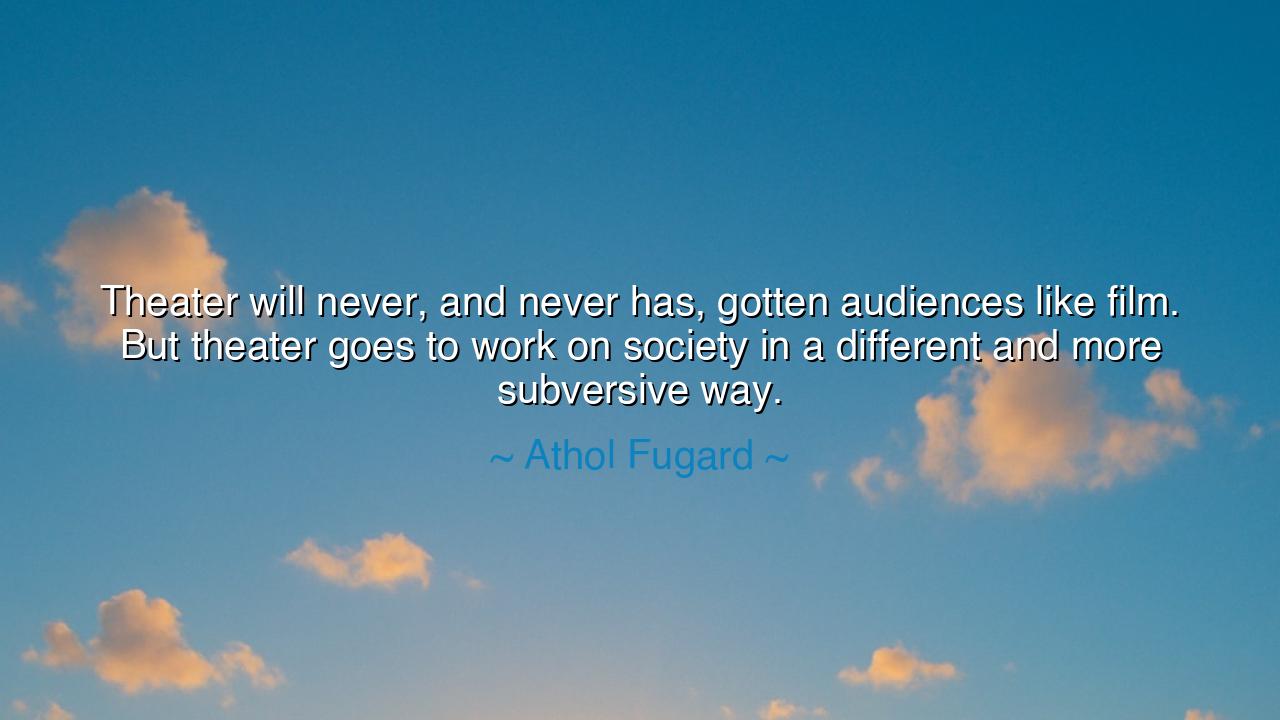
Theater will never, and never has, gotten audiences like film.
Theater will never, and never has, gotten audiences like film. But theater goes to work on society in a different and more subversive way.






Hear the words of Athol Fugard, the playwright of South Africa, whose pen pierced injustice with the sharpness of a blade: “Theater will never, and never has, gotten audiences like film. But theater goes to work on society in a different and more subversive way.” These words, though modest in tone, ring with the truth of centuries. They remind us that not all power is measured by numbers, nor all influence by fame. For some forces work not with thunder but with whispers, not with vast crowds but with intimate gatherings that kindle revolutions in the soul.
The film is mighty; it dazzles with spectacle, it draws multitudes into its glow, it spreads across the earth like fire in dry grass. But the theater, though humbler, wields a more ancient and subtle magic. In the presence of living actors, flesh and blood before our eyes, something dangerous and sacred occurs. Illusions break down, masks are stripped away, and the audience is drawn not only to watch but to feel as if they themselves are complicit in the drama. Thus, the theater is not a mirror held at a distance, but a flame pressed close to the skin.
History itself testifies to this truth. Recall the ancient Greeks, who gathered in their amphitheaters not merely to be entertained, but to confront the deepest questions of justice, fate, and the will of the gods. The tragedies of Sophocles and Aeschylus tore open the heart of the polis, forcing citizens to wrestle with guilt, power, and divine law. No empire-wide spectacle could strike as deeply, for theater acted as a surgeon of the soul, cutting away illusions so that truth might breathe.
So too did Fugard wield the stage against the chains of apartheid. While the cameras of the world might capture protest and violence, his plays quietly eroded the walls of hatred from within. In small halls, under the watchful eyes of censors, actors spoke words that could not be shouted in the streets. They stirred consciences, awakened empathy, and planted seeds of rebellion in the hearts of ordinary men and women. Here lay the subversive power of the theater: not to command millions at once, but to change the few who would, in turn, change the many.
We see this pattern again and again. The Roman emperors feared poets and actors more than generals, for words spoken on a stage could undermine loyalty more effectively than any blade. In the Middle Ages, plays performed in marketplaces taught the people truths about justice and morality that no priest could forbid. In our own age, small productions challenge systems of power more dangerously than films designed for profit, because they dare to question openly, to strip the world bare without apology.
The lesson is clear: greatness is not measured by size of audience, but by depth of impact. The theater teaches us that quiet voices can topple loud tyrannies, and that truth spoken in intimacy can pierce more deeply than spectacle shouted to millions. This is the power of the subversive—to enter not through the gates of numbers, but through the hidden door of the human heart.
Therefore, O seeker, take this wisdom into your own life: do not despise the small stage upon which you act. Whether you speak to one or to a thousand, let your words carry truth. Whether your deeds are seen by many or by few, let them be fearless. For the true measure of change is not how many see, but how deeply they are moved. And when you find yourself an audience, no matter how small, remember: you stand in the tradition of theater, the ancient art that works upon society in ways unseen, but never unfelt.
Thus, let us honor the theater, the flame that burns not with numbers, but with depth. It may never rival the film in its reach, but in its power to stir rebellion, awaken conscience, and whisper dangerous truths, it stands eternal. This is the wisdom Fugard leaves us: seek not only to be seen, but to subvert, to awaken, and to transform. For in the end, that is the true work of art.






AAdministratorAdministrator
Welcome, honored guests. Please leave a comment, we will respond soon